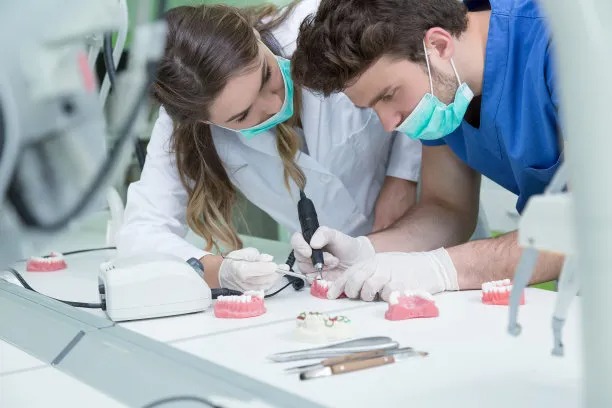Summary: Root canal treatment is a crucial dental procedure aimed at saving infected or damaged teeth and ensuring optimal dental health. However, to achieve successful outcomes, specific guidelines must be followed meticulously. This article delves into four essential aspects that ensure safe and effective root canal procedures: proper diagnosis and treatment planning, infection control protocols, techniques and materials used, and post-treatment care. By adhering to these guidelines, dental professionals can enhance patient experiences and significantly lower the risks associated with root canal treatments.
1. Proper Diagnosis and Treatment Planning

Accurate diagnosis is pivotal for effective root canal treatment. Dentists must use a comprehensive approach that includes patient history evaluation, clinical examination, and advanced imaging techniques such as X-rays or Cone Beam CT scans. This comprehensive assessment aids in identifying the extent of infection, the number of canals present, and any anatomical variations that may complicate the treatment process.
Once a thorough diagnosis is made, proper treatment planning should follow. Dentists must consider factors such as the patients overall health, the condition of the affected tooth, and the patient’s preferences. A well-structured treatment plan not only aligns with the clinical findings but also helps in setting realistic expectations for patients regarding pain management and recovery time.
Moreover, communication with the patient plays a vital role in the planning phase. Dentists should clearly explain the procedure, the significance of each step, and the potential outcomes. Educating patients about the importance of root canal treatment reinforces their commitment to follow through with the procedure, ensuring a collaborative approach in achieving optimal dental health.
2. Infection Control Protocols
Infection control during the root canal procedure is essential to prevent complications and ensure patient safety. Adherence to strict aseptic techniques is crucial, beginning with effective sterilization of instruments and use of disposable materials wherever applicable. Dentists should utilize personal protective equipment (PPE) such as gloves, masks, and eyewear to minimize the risk of cross-contamination.
During the treatment, maintaining a clean operative field is paramount. Overseeing the suction and irrigation systems meticulously can help manage any debris or fluids that could harbor bacteria. Utilizing antimicrobial agents during the procedure can further reduce the infection risk, contributing to successful treatment outcomes.
Post-treatment infection control is equally important. Dentists should prescribe appropriate antibiotics if necessary, especially in cases of severe infections. Regular follow-ups help in monitoring the healing process, allowing for early intervention if complications arise, thereby ensuring the patients overall health and well-being.
3. Techniques and Materials Used
The choice of techniques and materials during root canal treatment significantly influences the success of the procedure. A combination of mechanical instrumentation and chemical disinfection is often employed to clean and shape the root canals effectively. Dentists must be familiar with various files and instruments, selecting those that best suit the specific root canal anatomy of the patient.
Moreover, the materials used for filling the cleaned canals after treatment are crucial. Biocompatible materials such as gutta-percha are commonly utilized for this purpose, providing a hermetic seal to prevent future infections. Newer alternatives like thermoplasticized fillers increasingly offer enhanced sealing capabilities, appealing to modern dental practices.
Staying updated with the latest advancements in root canal techniques and materials can significantly impact the efficacy of treatments. Continuous professional development and training ensure that dental practitioners are well-versed in technology and best practices, leading to improved patient outcomes.
4. Post-Treatment Care and Monitoring
Post-treatment care is vital for a successful recovery from root canal therapy. Dentists should provide clear instructions regarding pain management, dietary restrictions, and oral hygiene practices. Patients should be advised to avoid hard or sticky foods for a few days post-procedure to prevent dislodging any temporary filling or exacerbating discomfort.
Follow-up appointments must not be overlooked. These visits allow the dentist to assess the tooth’s healing, ensure that no complications have developed, and confirm the success of the treatment. Addressing any concerns or symptoms patients may experience during recovery helps reinforce a supportive dental relationship.
Additionally, educating patients about the signs of potential complications, such as prolonged pain or swelling, encourages them to seek timely help. This proactive approach is instrumental in promoting long-term dental health and fostering patient trust in their dental provider.
Summary:
In conclusion, the essence of successful root canal treatment lies in the meticulous application of essential guidelines that encompass proper diagnosis, stringent infection control, appropriate techniques and materials, and diligent post-treatment care. By adhering to these principles, dental professionals can markedly enhance patient care and outcomes.
This article is compiled by Vickong Dental and the content is for reference only.
Vickong Dental
Vickong Dental is a large medical group established in Hong Kong in 2008 by professors from well-known medical universities in Guangdong and Hong Kong, as well as medical doctors from key national '985' universities (including Master's supervisors and senior professors). The chain of branches brings together expert dentists with PhDs and Master's degrees from Hong Kong and Mainland China, committed to providing high-quality dental treatment.
"Vickong Dental Practices the University Motto of 'Healing and Serving Society,' with a Stable Operation for Sixteen Years. It Has Been honored with Hong Kong Enterprise Leaders's Choice,' and is a Global Trusted Implant Center for the Nobel Implant System. Recommended by Hong Kong Metro Broadcast and Guangdong Television, it Serves Customers from Over Thirty Countries and Regions, Gaining the Trust and Favor of Citizens from the Guangdong-Hong Kong-Macau Greater Bay Area and Surrounding Cities.

Thousands of customers' unanimous praise
The most recognized and highly recommended dental service by customers in the Guangdong-Hong Kong-Macau Greater Bay Area
We Ensure You Receive Detailed Care and Attention Here
Hong Kong standards, Shenzhen prices, Your Trusted English-speaking dentists

Vickong Dental Medical-Grade Instrument Disinfection Process
Vickong Dental Medical-Grade Instrument Disinfection Process

Vickong Dental Chain: A Warm and Comfortable Environment for Treatment






Appointment Hours

Q&A
Why choose Vickong Dental?
Vickong Dental practices the university motto 「Medicine to Benefit Society」, with each branch bringing together highly qualified dentists with doctoral and master’s degrees from Hong Kong and the Mainland, and has maintained seventeen years of steady operation。Recipient of 「2024 Hong Kong Enterprise Leaders Brand」, 「2025 Hong Kong Enterprise Leaders Brand」, a Nobel Biocare Global Trusted Implant Center, and a brand recommended by Metro Radio Hong Kong and Guangdong TV。
To date, we have served customers from more than thirty countries and regions,earning exceptionally high word-of-mouth recognition and trusted recommendations from residents across the Guangdong-Hong Kong-Macao Greater Bay Area and surrounding cities
We have eight major branches in Zhuhai、Shenzhen,and a consultation and service assurance center in Hong Kong,so you can book a free consultation at any time for any questions,which is very reassuring.
If I do not accept the quotation after the CT scan, will I be charged??
No! As long as the actual treatment has not started, you will not be charged any fees.
Will there be any additional charges during the treatment process?
No, there won’t be any additional charges. Before treatment begins, we will clearly explain the treatment plan and its corresponding fees. Only after the patient agrees and signs the consent form will we proceed with the dental service.
Can I pay in Hong Kong dollars?
Yes. Vickong Dental accepts payment in Hong Kong dollars. The amount will be converted based on the exchange rate of the day, and the applicable rate will be clearly communicated to you in advance.
Can I reschedule my appointment at any time?
Yes. Please contact us via **WeChat** or **WhatsApp** as early as possible, providing your original appointment time and details, along with your preferred new date and time slot for rescheduling.













